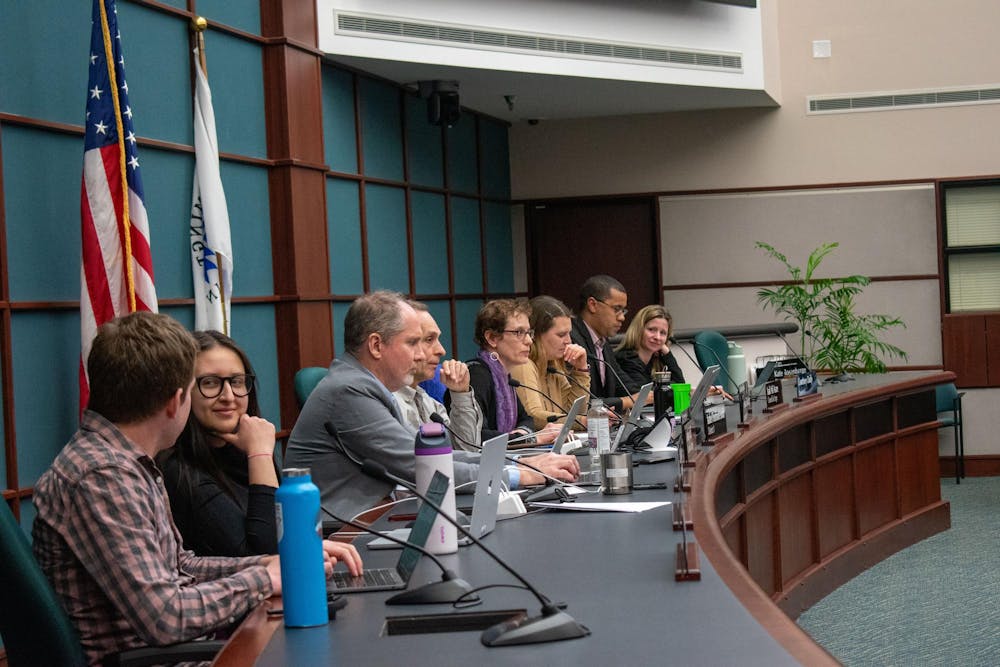The Bloomington City Council expressed its opposition to a state-sponsored pipeline that could divert up to 100 million gallons of water a day from the Wabash River into Boone County, Indiana, during its meeting Wednesday night. Although the resolution opposing the pipeline passed with five councilmembers voting in favor and four abstaining, Bloomington Mayor Kerry Thomson said she would not sign the resolution.
The council first heard the resolution, co-sponsored by councilmembers Andy Ruff and Dave Rollo, during its meeting March 6. They postponed the vote after Thomson and local economic group leaders cautioned that supporting the resolution could damage the city’s relationship with the Indiana Economic Development Corporation, which is managing the project. Thomson noted during the March 6 meeting that the city, on behalf of the Indiana Uplands region, submitted a $75 million proposal to the IEDC for economic development initiatives.
In May 2023, the IEDC signed a $10 million contract with the state to create a 35-mile water pipeline running from Lafayette to Lebanon, Indiana. The pipeline — which would divert water to support a 9,000-acre manufacturing district in Boone County called the Limitless Exploration Advanced Pace District — has faced pushback from residents.
Tippecanoe County residents formed a group called “Stop the Water Steal” to oppose the proposed pipeline. Citizens Action Coalition, a consumer advocacy group, also criticized the IEDC for lacking transparency with the public when developing project plans.
Governing bodies for Attica, Lafayette, West Lafayette and Monticello, along with Miami, Benton and Tippecanoe counties, have passed legislation opposing the project.
In December 2023, Indiana Gov. Eric Holcomb paused further development until the Indiana Finance Authority conducts a study to estimate the groundwater and surface water demand and availability in the region. Preliminary data for a statewide water study — which includes data from the LEAP pipeline — will be released in late spring or summer 2024.
Ruff said Wednesday that representatives from the IEDC and Indiana Finance Authority organizations declined requests to speak during the meeting.
The council amended the original resolution Wednesday night to include two clauses describing how water is a limited resource in Indiana along with a section encouraging the Indiana General Assembly to create a comprehensive water management plan.
During the public comment about the resolution, Thomson said she would not sign any resolutions addressing issues outside city business. She said she did not think the council needed to issue an official opinion on topics outside city business, because the councilmembers and residents have other opportunities to express their concerns during public comment.
"There are significant problems that we are trying to solve and there are also many opportunities at hand which demand my full attention and I believe could demand yours as well,” Thomson said. “I will be spending my time on the issues where I can effect change directly.”
Deputy Mayor Gretchen Knapp said in an email Thomson’s statement also applies to a resolution calling for a ceasefire and aid in Gaza. The council will hear this resolution at its next meeting April 3.
“Her statement applies to any resolutions outside of City business, and Council President Piedmont-Smith is aware of the mayor’s intent in that regard including matters of federal foreign policy,” Knapp said. “We have a lot of work to accomplish with Council and other partners for our city, and we need to focus all of our time and energy on that work.”
According to Indiana Code, Thomson must sign or veto resolutions that come to her desk. Failing to sign the resolution means the legislation is considered vetoed. If she vetoes the legislation, the resolution will be returned to the council for another vote. However, six of the nine councilmembers must vote to override her veto.
Four councilmembers — Isak Asare, Sydney Zulich, Matt Flaherty and Kate Rosenbarger — abstained from the vote on the pipeline resolution.
While explaining why he would not support the measure, Flaherty said voting on the LEAP pipeline was “far down the spectrum” of issues the council should address.
CORRECTION: A previous version of this article incorrectly identified where the founders of the group “Stop the Water Steal” are based.






